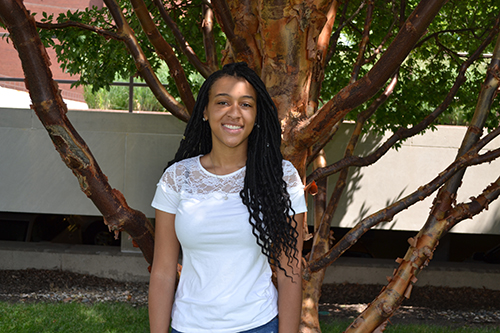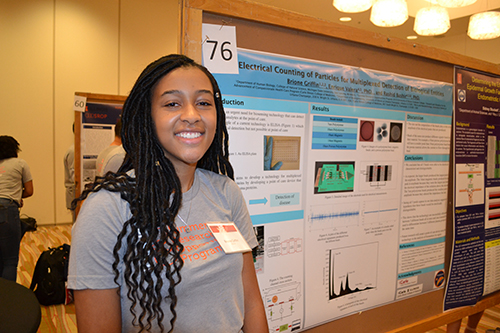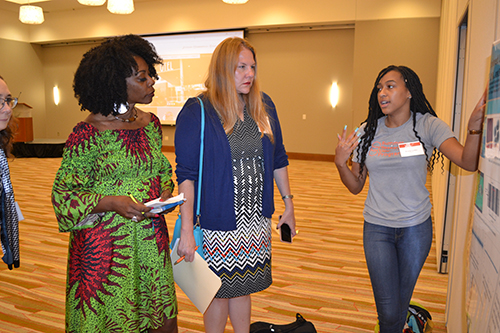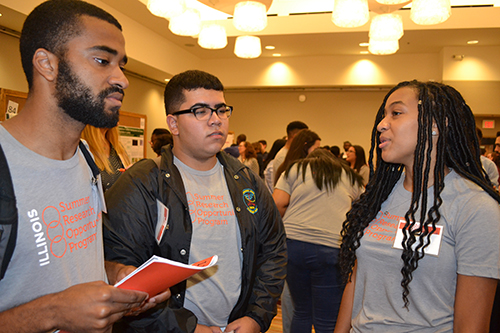Undergrad Brione Griffin Gets One Step Closer to Her Dream of Becoming a Doctor Via REACH RCEU

REACH participant, Bri Griffin.
July 25, 2018
Brione Griffin’s career goals have always been “to be a doctor—to be a doctor and help people out.” So when she learned about REACH (Research and Education for the Advancement of Compassionate Health Care) RCEU (a Research Experience for Undergraduates with an added clinical component), which is sponsored and funded by the new Carle Illinois College of Medicine, she was intrigued.
"I think it's something I've loved all my life,” Griffin says regarding her passion for science, biology, and medicine. She shares an anecdote about how she got interested in those.
“When I was younger, my cousin was in a car accident, and I remember being at the hospital and people being concerned about whether she'd make it or not, and just watching the doctors and how hard and how diligent they were working with her. And it just made me feel like this is something that I would want to do. And I've always just had a passion for helping people, so I feel like the medical route [would help me do that]. I never knew what kind of doctor I wanted to be, but I just knew I wanted to be a doctor—be a doctor and help people out.”
It was her dream of becoming a doctor that brought Griffin to REACH. A rising junior majoring in human biology at Michigan State, she was interested in doing research and was looking into a lot of programs. Because she’s not sure if she wants to go to graduate school or medical school after graduation, she thought the REACH program was a good fit because it allows clinical exposure, plus exposure to the graduate college as well.

Bri Griffin with her poster at the Illinois Summer Research Symposium.
The clinical component turned out to be one of the highlights of the summer for Griffin. She remarks, “I love the clinical part; it's my favorite part. I love everything. I'm glad I made my decision to come here.”
Of course, she loved shadowing Dr. Kevin Teal, a neurosurgeon in the Carle Clinic Spine Institute. “It's been amazing,” she reports. “I actually got to go watch him perform surgery last week, and it was super, super cool. I got to stand right there while he performed the surgery. He was removing bones from the spine to relieve pressure on the back.”
Did seeing the blood get to her? "No, not at all," Griffin asserts, which is key since Griffin wants to be an OB-GYN.
In fact, when she shadowed Teal, she told him of her interest in the area, so he checked around to see if he could find an OB-GYN colleague she could watch. While she didn't get to see a baby delivered, she did get to watch his colleague remove a patient’s fallopian tubes. "So that was pretty cool!" she remarks.
She indicates that the research component, while a really good learning experience, was a bit overwhelming. She says it was “definitely a new experience, because I've never done anything like this before. In the beginning, I felt a little intimidated as someone new going in, not doing any of this before. But the people in my lab were so helpful and so welcoming."

Bri Griffin explianing her research to Lisa Goodpaster and Ruby Mendenhall (right to left)
Her research in the lab of Dr. Rashid Bashir focused on improving the multitextation of protein analysis to develop a point-of-care device to detect biomarker sepsis. What did she think about working in the lab of such a world-renowned researcher as Dr. Bashir? She reports, “After the first time I met him, and I went back and did my research on him, I'm like, 'Yeah, I probably won't be seeing him a lot.'"
One of the challenges Griffin encountered this summer was being away from her family. She grew up in Canton Michigan (about 30 minutes from Detroit), and went to Michigan State, about an hour from home. So she admits to being homesick this summer.
“I've never been this far away from my family for this amount of time, so that's been kind of tough, not being able to see my mom or dad or my sister.” Another thing she missed was the home cooked meals. While she's used to living in a dorm and dorm food, because she goes to school so near home, she goes home once a month or every couple of weeks.
Another challenge was making the poster. While she's taken lab courses where she's had to make a poster, it's usually been a team effort. "But I've never done one all by myself, so it's been kind of tough, trying to put it all together." But she says the people in her lab have been very helpful, very hands-on.

Bri Griffin explaining her research to two other REACH participants, Alexis Chamorro-Ortiz and Darius Carter (right to left).
Her favorite part was definitely the people. "Being able to meet so many different people from all over the country that I never thought that I would have the opportunity to meet. That's definitely the biggest part. And just being around people similar to myself, who have similar goals and want to do similar things; it's been a really good learning experience.”
Griffin's future plans include medical school, obviously, since she wants to become a doctor. However, she is thinking of taking a “gap year” and going to graduate school.
Might Griffin show up at Illinois in a couple of years to be a part of the Carle Illinois College of Medicine? Maybe. While she thinks she'd like to stay close to home, she says, "I will definitely apply here. The hospitality and how great it's been here, I will definitely apply here.”
Story and photos by Elizabeth Innes, Communications Specialist, I-STEM Education Initiative.
For additional stories about the REACH RCEU, see:
For more related stories, see: Carle Illinois, REU, Student Spotlight, Summer Research Programs, Underserved Students / Minorities, 2018













.jpg)
















